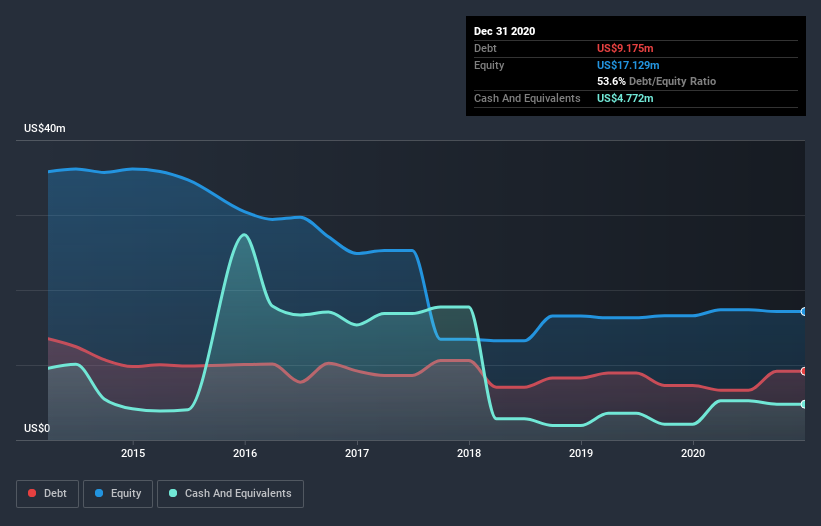
Howard Marks put it nicely when he said that, rather than worrying about share price volatility, 'The possibility of permanent loss is the risk I worry about... and every practical investor I know worries about.' So it seems the smart money knows that debt - which is usually involved in bankruptcies - is a very important factor, when you assess how risky a company is. Importantly, Cham Foods (Israel) Ltd (TLV:CHAM) does carry debt. But should shareholders be worried about its use of debt?
What Risk Does Debt Bring?
Generally speaking, debt only becomes a real problem when a company can't easily pay it off, either by raising capital or with its own cash flow. Ultimately, if the company can't fulfill its legal obligations to repay debt, shareholders could walk away with nothing. While that is not too common, we often do see indebted companies permanently diluting shareholders because lenders force them to raise capital at a distressed price. Of course, debt can be an important tool in businesses, particularly capital heavy businesses. The first step when considering a company's debt levels is to consider its cash and debt together.
See our latest analysis for Cham Foods (Israel)
How Much Debt Does Cham Foods (Israel) Carry?
As you can see below, at the end of December 2020, Cham Foods (Israel) had US$9.18m of debt, up from US$7.27m a year ago. Click the image for more detail. However, it also had US$4.77m in cash, and so its net debt is US$4.40m.

A Look At Cham Foods (Israel)'s Liabilities
According to the last reported balance sheet, Cham Foods (Israel) had liabilities of US$13.4m due within 12 months, and liabilities of US$1.24m due beyond 12 months. Offsetting this, it had US$4.77m in cash and US$8.35m in receivables that were due within 12 months. So it has liabilities totalling US$1.50m more than its cash and near-term receivables, combined.
Given Cham Foods (Israel) has a market capitalization of US$13.9m, it's hard to believe these liabilities pose much threat. But there are sufficient liabilities that we would certainly recommend shareholders continue to monitor the balance sheet, going forward.
We use two main ratios to inform us about debt levels relative to earnings. The first is net debt divided by earnings before interest, tax, depreciation, and amortization (EBITDA), while the second is how many times its earnings before interest and tax (EBIT) covers its interest expense (or its interest cover, for short). This way, we consider both the absolute quantum of the debt, as well as the interest rates paid on it.
While Cham Foods (Israel) has a quite reasonable net debt to EBITDA multiple of 2.0, its interest cover seems weak, at 2.2. This does suggest the company is paying fairly high interest rates. Either way there's no doubt the stock is using meaningful leverage. The bad news is that Cham Foods (Israel) saw its EBIT decline by 12% over the last year. If that sort of decline is not arrested, then the managing its debt will be harder than selling broccoli flavoured ice-cream for a premium. There's no doubt that we learn most about debt from the balance sheet. But it is Cham Foods (Israel)'s earnings that will influence how the balance sheet holds up in the future. So when considering debt, it's definitely worth looking at the earnings trend. Click here for an interactive snapshot.
Finally, a company can only pay off debt with cold hard cash, not accounting profits. So it's worth checking how much of that EBIT is backed by free cash flow. In the last three years, Cham Foods (Israel) created free cash flow amounting to 19% of its EBIT, an uninspiring performance. For us, cash conversion that low sparks a little paranoia about is ability to extinguish debt.
Our View
Both Cham Foods (Israel)'s interest cover and its EBIT growth rate were discouraging. At least its level of total liabilities gives us reason to be optimistic. Taking the abovementioned factors together we do think Cham Foods (Israel)'s debt poses some risks to the business. So while that leverage does boost returns on equity, we wouldn't really want to see it increase from here. There's no doubt that we learn most about debt from the balance sheet. But ultimately, every company can contain risks that exist outside of the balance sheet. To that end, you should learn about the 2 warning signs we've spotted with Cham Foods (Israel) (including 1 which is potentially serious) .
Of course, if you're the type of investor who prefers buying stocks without the burden of debt, then don't hesitate to discover our exclusive list of net cash growth stocks, today.
When trading Cham Foods (Israel) or any other investment, use the platform considered by many to be the Professional's Gateway to the Worlds Market, Interactive Brokers. You get the lowest-cost* trading on stocks, options, futures, forex, bonds and funds worldwide from a single integrated account. Promoted
Valuation is complex, but we're here to simplify it.
Discover if Tierra Properties S.C might be undervalued or overvalued with our detailed analysis, featuring fair value estimates, potential risks, dividends, insider trades, and its financial condition.
Access Free AnalysisThis article by Simply Wall St is general in nature. It does not constitute a recommendation to buy or sell any stock, and does not take account of your objectives, or your financial situation. We aim to bring you long-term focused analysis driven by fundamental data. Note that our analysis may not factor in the latest price-sensitive company announcements or qualitative material. Simply Wall St has no position in any stocks mentioned.
*Interactive Brokers Rated Lowest Cost Broker by StockBrokers.com Annual Online Review 2020
Have feedback on this article? Concerned about the content? Get in touch with us directly. Alternatively, email editorial-team (at) simplywallst.com.
About TASE:TRP
Tierra Properties S.C
Tierra Properties S.C Ltd produces, sells, and markets food ingredients in Israel and internationally.
Adequate balance sheet and overvalued.
Market Insights
Community Narratives



